Benefits of IVIG therapy at home
In recent years, the healthcare industry has witnessed a notable shift towards home-based treatments, offering patients greater convenience and enhanced care experiences. Intravenous immunoglobulin (IVIG) therapy is at the forefront of this trend, delivering substantial benefits when administered at home, particularly for those with immune deficiencies and certain autoimmune disorders. As we delve into this transformative approach, it is important to understand the comprehensive aspects of IVIG therapy, from its clinical applications to healthcare system implications.
Understanding IVIG Therapy and its Home Application
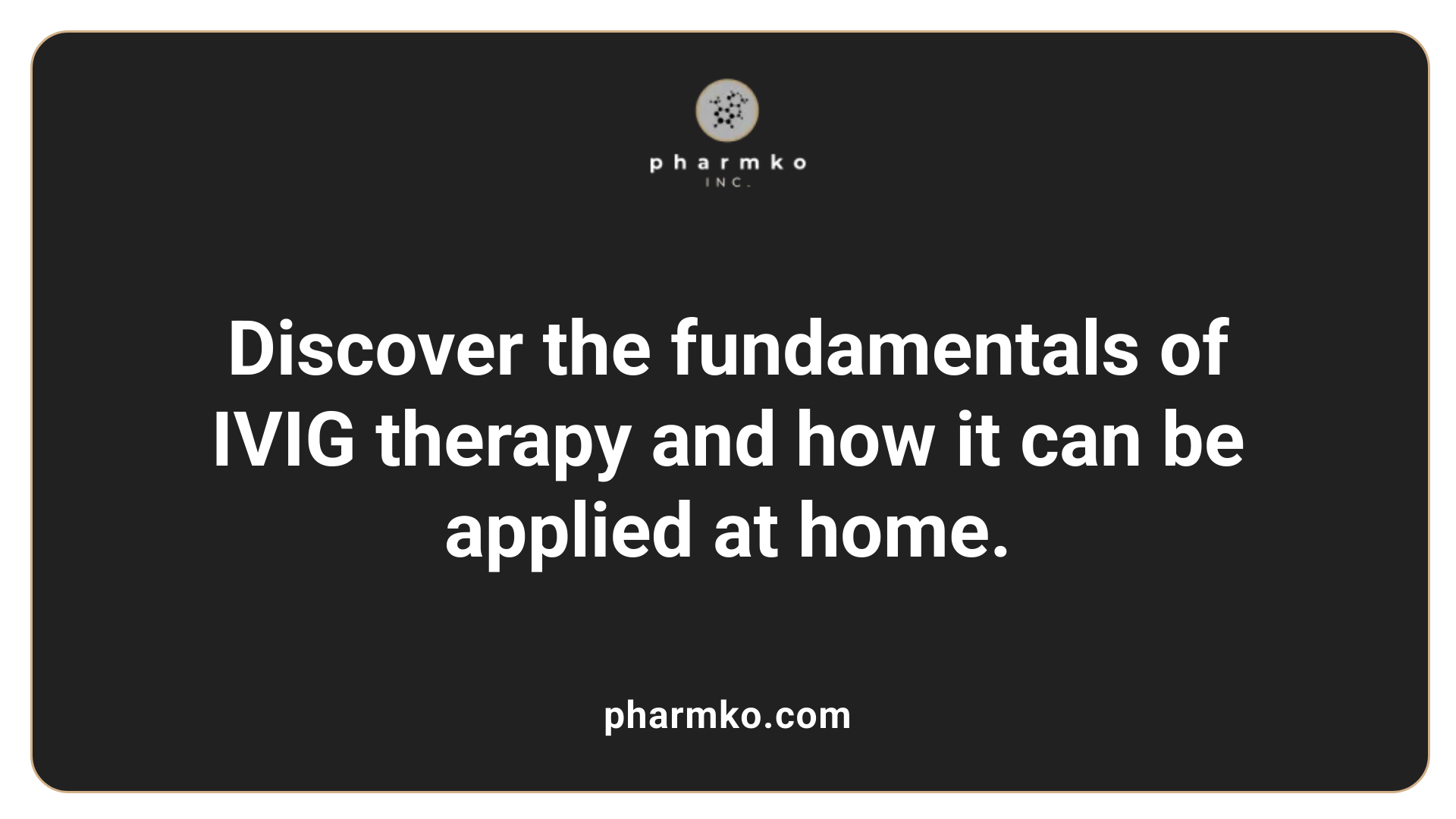
Basics of IVIG therapy
IVIG therapy, or intravenous immunoglobulin therapy, is a treatment that provides essential antibodies to individuals suffering from various disorders. It is primarily utilized to manage primary immunodeficiency diseases, autoimmune diseases, and sometimes infections. By enhancing the body’s immune response, IVIG can significantly benefit those with a weakened immune system.
Conditions treated with IVIG
IVIG is effective for managing several conditions, including:
- Primary Immunodeficiency Disease : Helps strengthen the immune system.
- Autoimmune Disorders : Aids in reducing the immune system’s attack on the body, such as in lupus or myositis.
- Peripheral Neuropathy : Can alleviate symptoms such as weakness and numbness, thereby improving quality of life.
Considerations for home treatment
Home administration of IVIG therapy is an increasingly viable option, especially after recent legislative changes to Medicare benefits. Patients must be well-prepared for this therapy, which typically requires infusions every 3 to 4 weeks. Conditions for safe home treatment include:
- Professional Training : Administering IVIG at home necessitates proper training for the patient or caregiver.
- Equipment and Monitoring : Essential supplies must be readily available, including the necessary medical equipment and nursing support to monitor safety.
- Personalization and Vaccination : Dosages are tailor-made for individual patients, considering body weight and medical condition, and timing of vaccinations must be managed carefully, as IVIG can influence vaccine effectiveness.
The Advantages of IVIG Therapy at Home
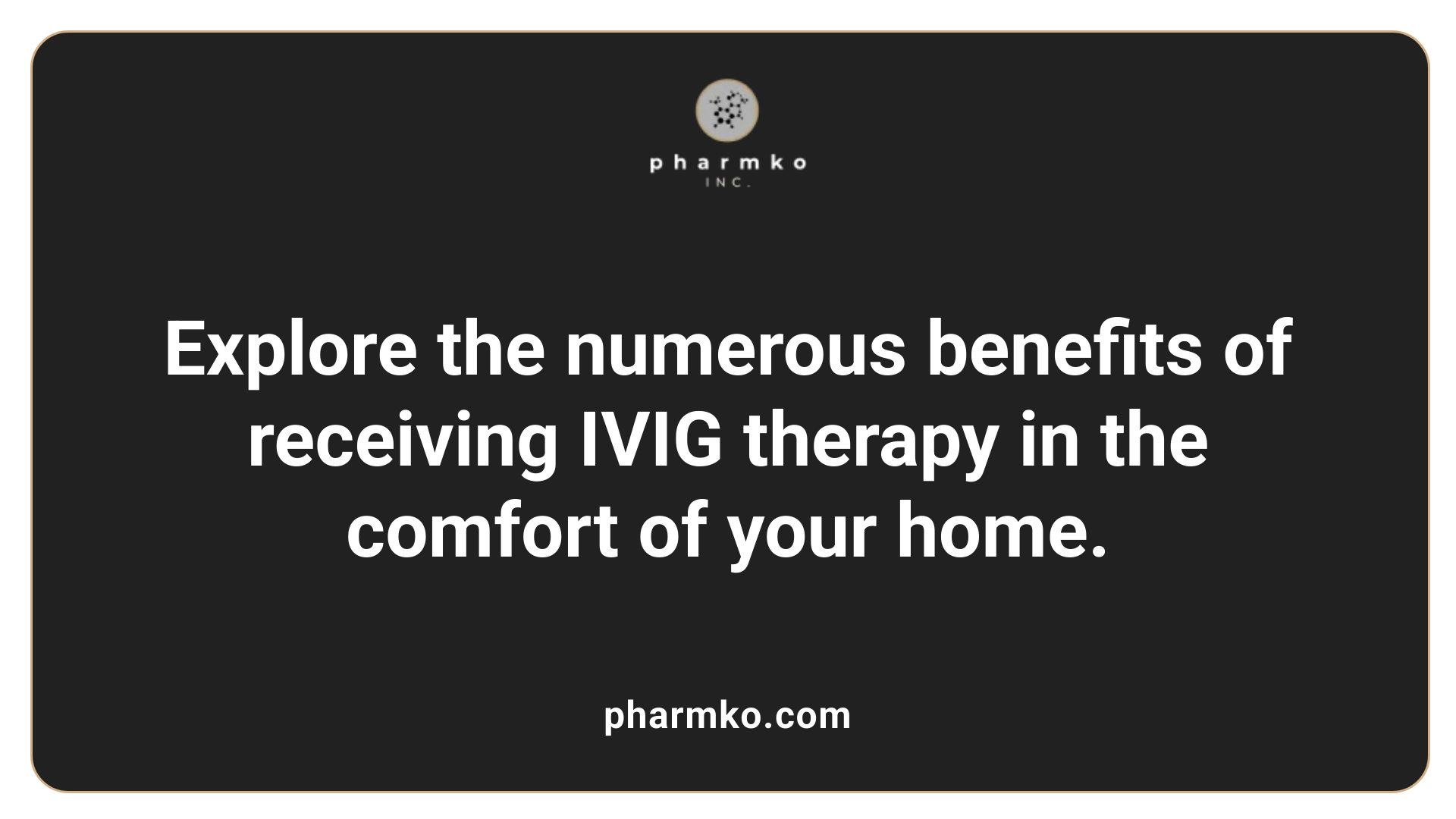
What are the advantages of intravenous immunoglobulin (IVIG) therapy when administered at home?
Administering intravenous immunoglobulin (IVIG) therapy at home provides several vital advantages for patients.
-
Convenience and flexibility
Home administration allows for scheduling treatments that fit seamlessly into a patient's daily routine. This flexibility can significantly enhance treatment adherence and overall satisfaction with care. -
Reduced exposure to infections
Receiving IVIG at home minimizes the risk of hospital-acquired infections. Patients undergoing treatment in outpatient settings face higher exposure to germs, which can be particularly concerning for those with weakened immune systems. -
Patient autonomy
Patients often report a greater sense of control and autonomy when managing their care at home. This autonomy positively affects their emotional well-being, as they can be in a familiar environment while undergoing treatment.
Overall, home-based IVIG therapy presents an opportunity to improve the quality of life for individuals with antibody deficiencies, increasing comfort and health outcomes while reducing healthcare costs.
Benefits Summary
| Advantage | Description | Outcome |
|---|---|---|
| Convenience and flexibility | Flexible scheduling around daily life | Improved adherence and satisfaction |
| Reduced exposure to infections | Lower risk of hospital-acquired infections | Better health outcomes |
| Patient autonomy | Empowerment to manage treatment in a familiar setting | Enhanced emotional well-being |
The ongoing trend towards home health care underscores the increasing support for home-based IVIG therapy, making it a promising option for many patients.
Comparative Outcomes: Home vs. Outpatient IVIG Therapy
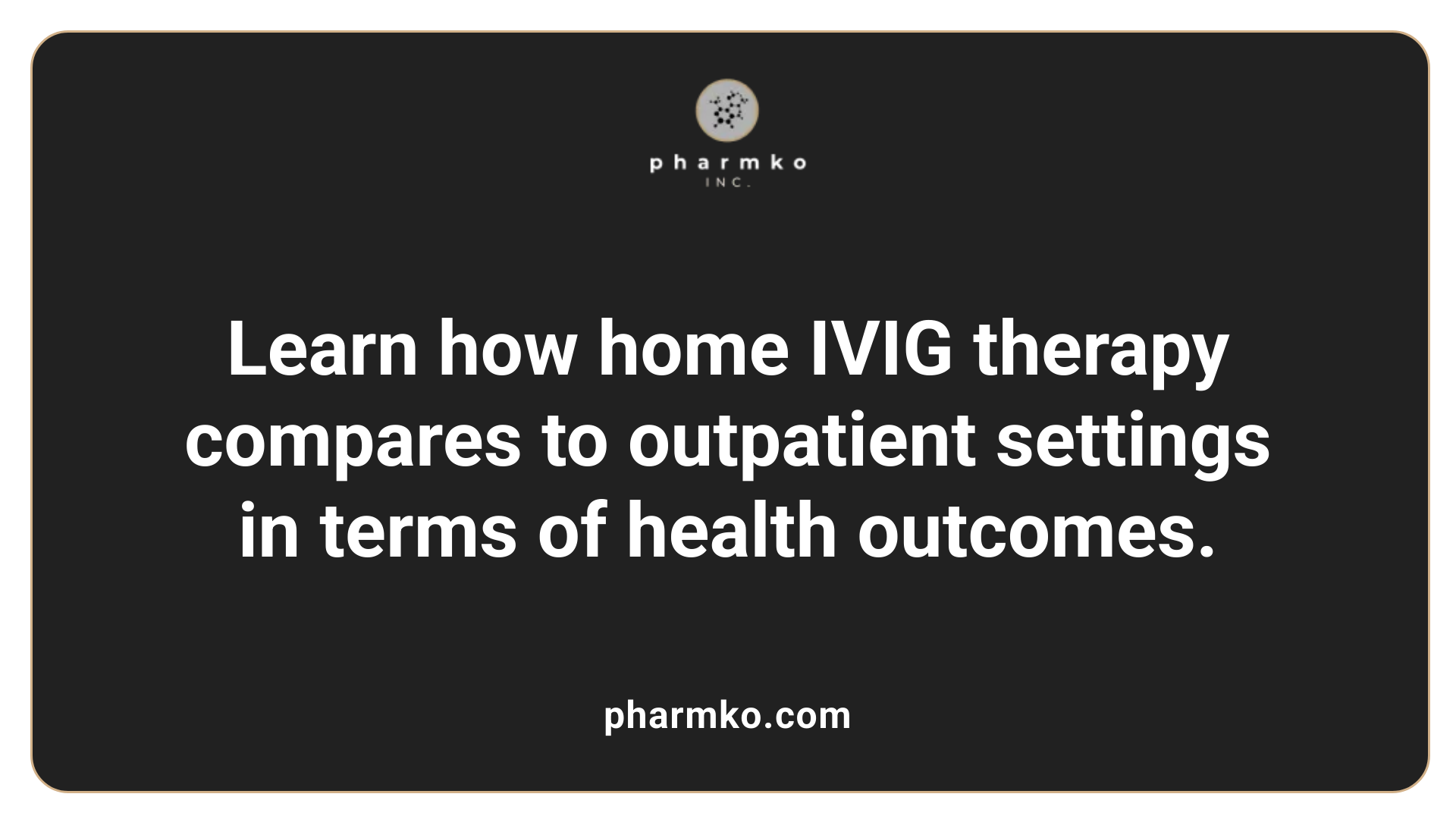
How does home IVIG therapy compare with traditional outpatient settings in terms of health benefits and outcomes?
Home IVIG therapy offers numerous advantages over traditional outpatient settings. Research shows that patients receiving IVIG infusions at home have significantly lower odds of hospitalization and emergency department visits. For instance, patients were found to be 44% less likely to require inpatient care and 38% less likely to visit emergency departments compared to those treated in outpatient hospital settings.
Moreover, engaging in home therapy correlates with enhanced patient health outcomes. The odds ratio for inpatient stays stood at 0.56 , and for emergency visits, it was 0.62 , indicating a strong clinical benefit from the home approach.
In terms of patient satisfaction and quality of life, home IVIG therapy fosters greater flexibility, allowing patients to maintain control over their schedules and daily activities. This has led to increased treatment adherence and improved overall well-being, as evidenced by systematic reviews emphasizing enhanced mental and physical health.
Finally, the economic implications of home therapy are noteworthy. Patients can save between $18,876 and $26,136 annually on infusion-related costs when opting for at-home treatment compared to outpatient care. This cost efficiency, combined with the favorable clinical outcomes, positions home IVIG therapy as a valuable option for those needing immunoglobulin treatments.
Medicare and Insurance Dynamics for Home IVIG
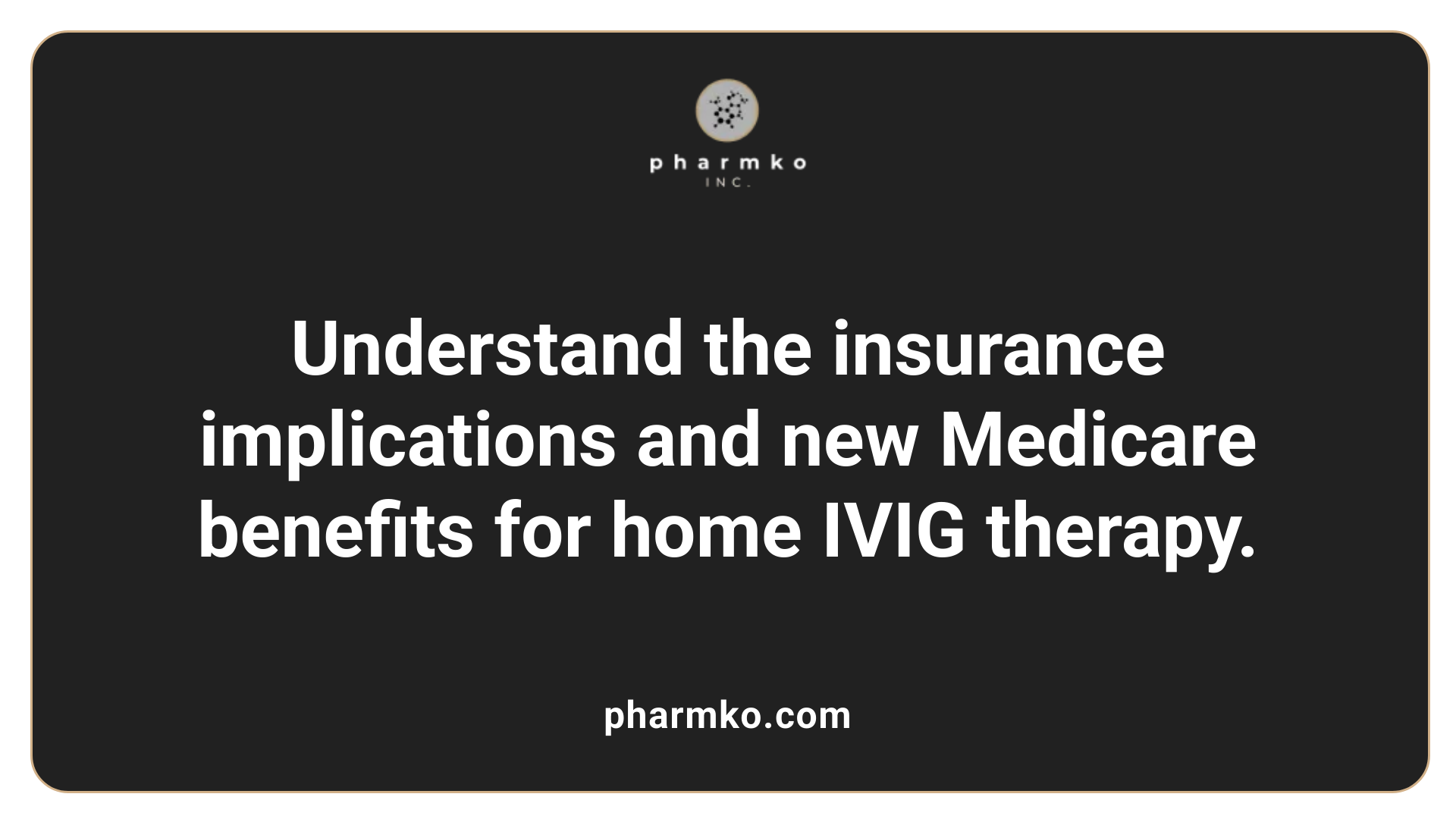
How can insurance cover and care coordination be managed for at-home IVIG therapy?
To effectively manage insurance coverage and care coordination for at-home IVIG therapy, patients should work in close collaboration with healthcare providers, case managers, and their insurance companies. Ensuring that all necessary documentation meets the specific requirements of insurance policies is essential, as coverage for IVIG can vary among plans.
Patients may benefit from engaging a reimbursement specialist who can help navigate the often-complex approval processes required by Medicare and other health insurance plans. Moreover, utilizing infusion pharmacies that offer comprehensive care coordination is crucial. These pharmacies can provide not only the medication but also nursing services, patient education, and clinical monitoring, all of which enhance treatment adherence and patient satisfaction.
What are the new Medicare benefits related to home IVIG infusions, and how do they impact patient accessibility and cost?
As of January 1, 2024, Medicare will permanently cover home intravenous immunoglobulin (IVIG) infusions for patients with primary immunodeficiency (PI). This landmark update, part of the 21st Century Cures Act and subsequent legislation, includes a bundled payment that encompasses the cost of the IVIG medication, necessary supplies, and nursing services.
Previously, patients faced challenges with high out-of-pocket expenses and restrictive coverage. This new framework alleviates those burdens, providing better access to care and enhancing overall health outcomes compared to treatments administered in outpatient settings. Reports indicate that the changes significantly improve availability and affordability for patients, marking a vital advancement in care for individuals with PI and promoting a broader acceptance of home-based therapies.
Logistical Elements of Home IVIG Therapy
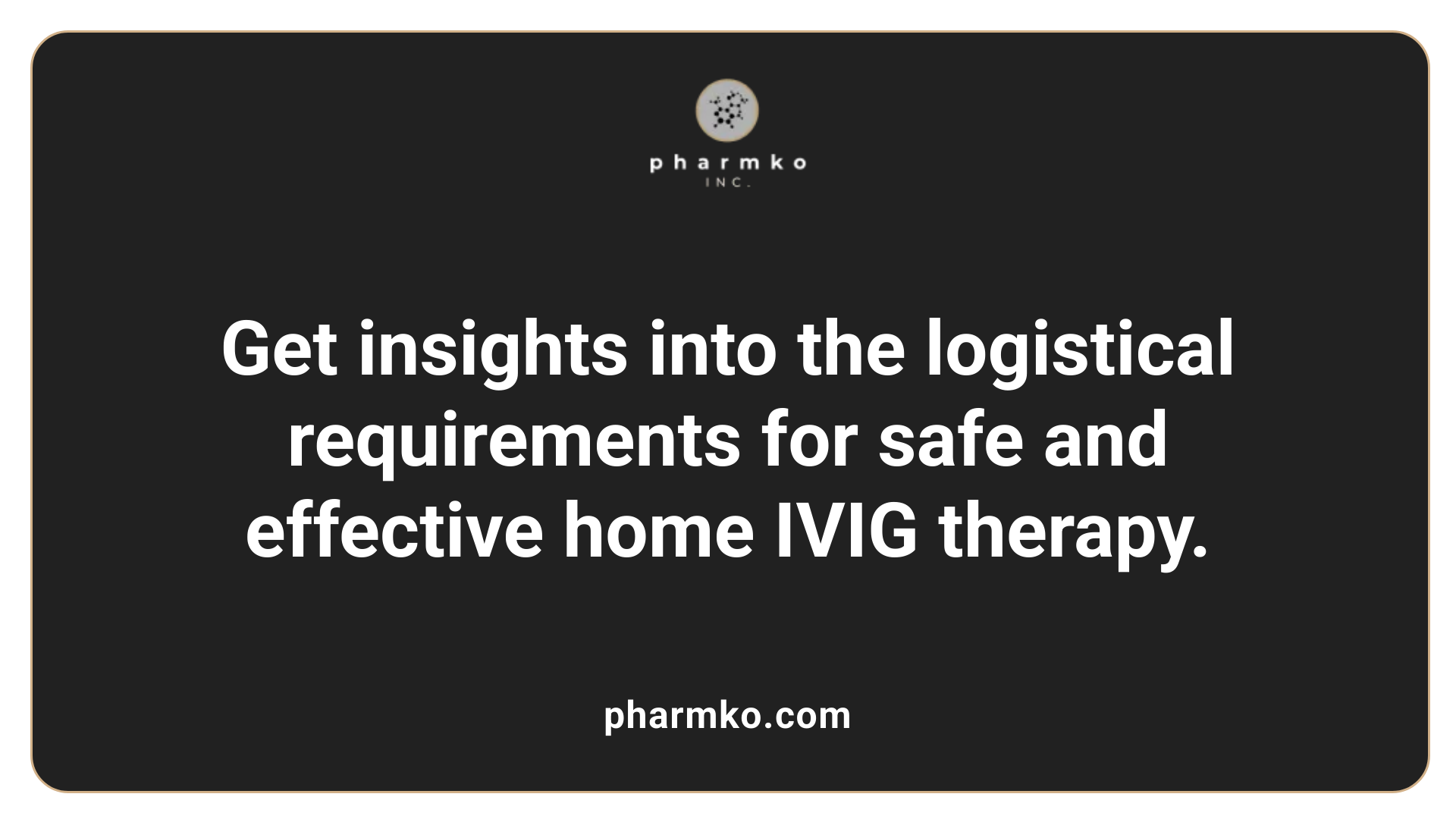
What are the logistics and required components for receiving IVIG therapy at home, including necessary nursing services?
Receiving IVIG therapy at home necessitates a well-organized approach involving several critical components. One of the primary logistics is the timely and sterile delivery of the IVIG medication. Organizations such as Marken and Wren Healthcare have developed patient-centric supply chains to ensure medications reach patients safely and on time.
Equally important is the requirement for skilled nursing services. Registered nurses are essential for administering the IVIG infusions safely and monitoring patients throughout the process. These services often include global nurse coverage to cater to diverse patient needs. Nurses also play a role in patient education, ensuring that patients are well-informed about their treatment and any necessary precautions.
Additionally, effective patient coordination is crucial. This involves seamless communication between healthcare providers and home care services. Continuous improvement in real-time document transmission enhances monitoring and support, allowing healthcare teams to respond promptly to any patient's needs.
Ultimately, these logistical elements aim to create a secure and supportive home environment for patients undergoing IVIG therapy, contributing to better overall health outcomes.
Embracing the Future of Home-Based IVIG Therapy
As healthcare increasingly transitions towards patient-centric home-based treatments, IVIG therapy stands as a prime example of this evolution. By offering enhanced clinical outcomes, increased patient satisfaction, and cost-saving benefits, home-based IVIG therapy not only improves the quality of life for those in need but also sets a precedent for future healthcare models that emphasize personalized, accessible, and effective care solutions. The continued support from Medicare and insurance providers will be instrumental in sustaining and expanding these transformative approaches.
References
- Home IVIG becomes a permanent Medicare benefit after ...
- Home IVIG Infusions May Reduce Costs and Improve Outcomes
- Home versus outpatient hospital intravenous ...
- Benefits of Home IVIG Therapy
- Intravenous Immunoglobulin (IVIg) Treatment: What to Know
- IVIG (Intravenous Immunoglobulin): Treatment & Side Effects
- Home-Based Subcutaneous Infusion of Immunoglobulin for ...
- Home-Based Treatment with Immunoglobulins













